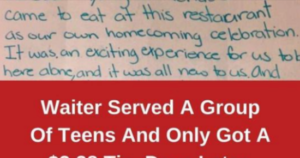
The waiter received a $3.28 tip while serving a group of teenagers. A Few Days Later, This Note Arrives
In the US restaurant business, tipping culture has produced a complicated situation where waiters frequently depend on tips from patrons to make ends meet.
Although it may be argued that the establishment should be accountable for paying equitable salaries, customers are already responsible for doing so. This behavior may result in instances when diligent servers give outstanding service yet receive insufficient tips.
The difficulties experienced by servers and the unexpected redemption that can occur are illuminated by an incident that occurred in Los Angeles.

The Inequitable Actuality
Servers in the modern American restaurant industry have a difficult situation because they are paid very little unless tips are left by patrons. Many people believe it is unjust that it is frequently the patrons’ goodwill that must guarantee livable wages. Sometimes this strategy makes dedicated servers skip meals since they aren’t making enough money. In the middle of this predicament, a recent Los Angeles occurrence provides a glimmer of optimism.
A Waiter’s Charitable Assistance
A waiter’s interaction with a group of teenagers route to their homecoming dance in Los Angeles had a significant effect. The server was driven to make sure the teenagers had the best possible eating experience because he also had recollections of high school dances. His service was a testament to his dedication, as he provided them with thoughtful and caring attention.
A depressing result
Even though the waiter provided excellent service, the result was disappointing. The adolescents left an outrageously small gratuity of $3.28, not even enough to pay for the most basic of bills. This incident highlights the difficult reality that servers must deal with. Their financial precariousness is perpetuated by the fact that exceptional service is not always rewarded with sufficient remuneration.
A Redeemer’s Letter
A few days later, the waiter’s viewpoint abruptly changed. The same group of teenagers who had left the small tip sent a letter. They offered an honest apologies in their remarks, exposing a hitherto unreported aspect of the tale.
One adolescent wrote a passionate letter thanking the server for his outstanding service during their homecoming party. They described how his professionalism, amiability, and willingness to make accommodations made their stay unforgettable. It became clear that their meager gratuity was not a reflection of his excellent service, but rather of their lack of comprehension.
A Sincere Apologies
The teenagers apologized in a humble and real way. They acknowledged that they were ignorant of the importance of leaving a tip and that their actions had unintentionally harmed the waiter. Their motives were not malevolent at all; they were only ignorant of customs around tipping. They apologized for the error and tried to make things right by including an additional gratuity in addition to the original 18% tip as a token of gratitude.
Introspection and Atonement
The episode emphasizes how crucial communication and empathy are. The letter from the teenagers shows the value of self-awareness and the will to learn from mistakes. Their open acknowledgment demonstrated the possibility of improvement and atonement in addition to making apologies for their inadvertent slight.
The Los Angeles article clarifies the nuances of the tipping culture and how it affects waiters’ lives. It serves as a warning that ignorance can lead to misinterpretations and oversights. But the sincere apologies from the teenagers demonstrate how things may turn around when people accept accountability for their acts. This occurrence makes us think about how we engage with service personnel and appreciate how hard they work. Through cultivating consciousness and compassion, we can make the world a more just and caring place.


